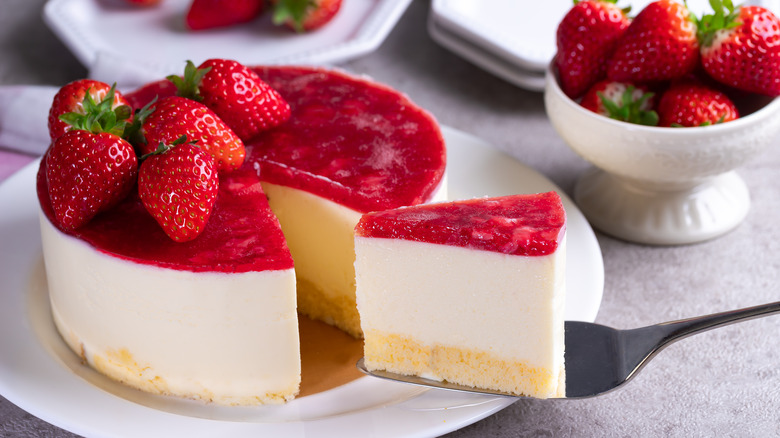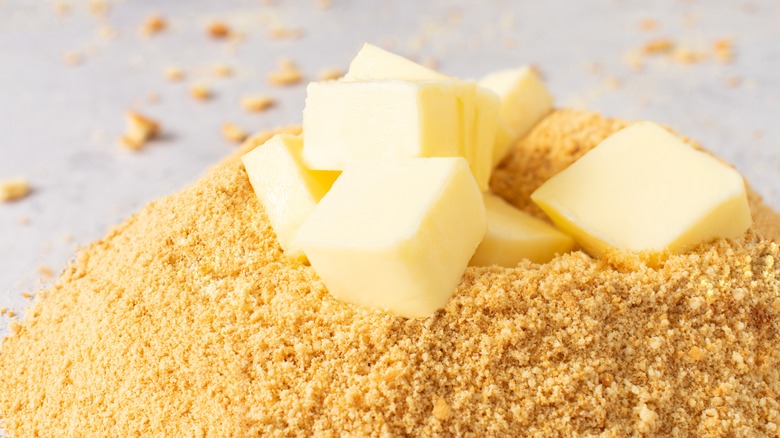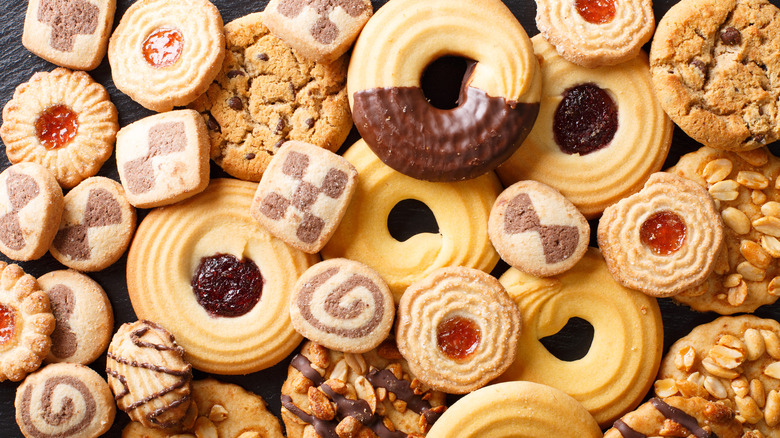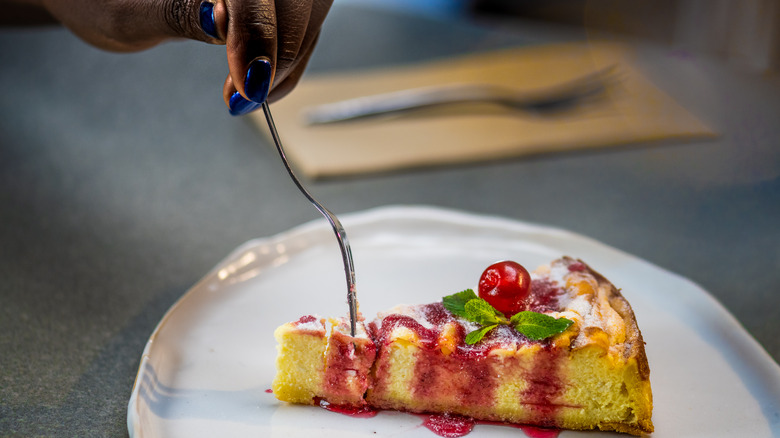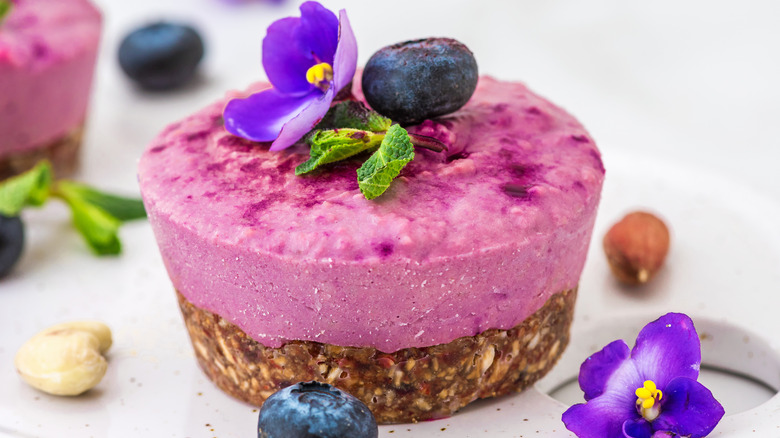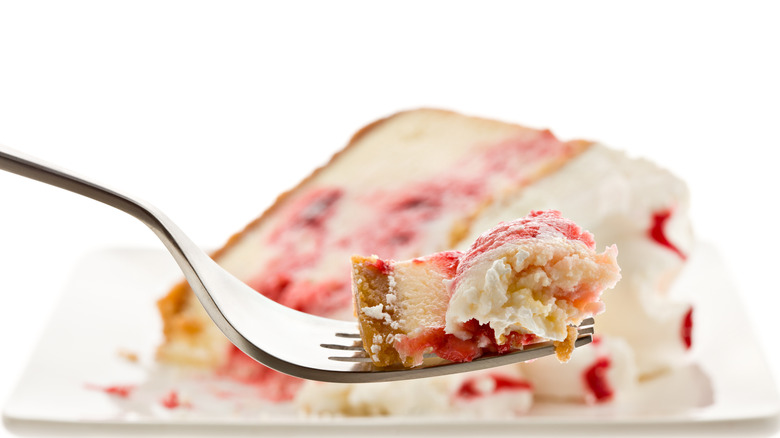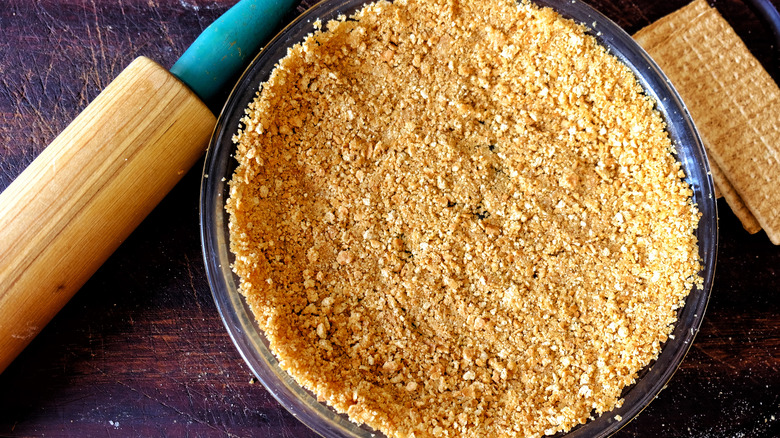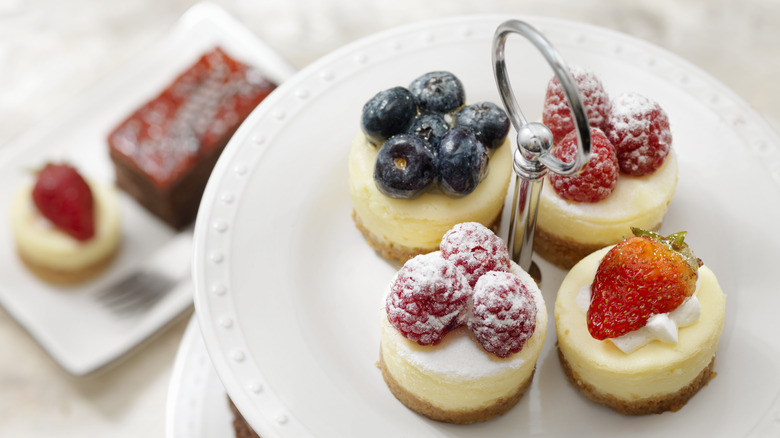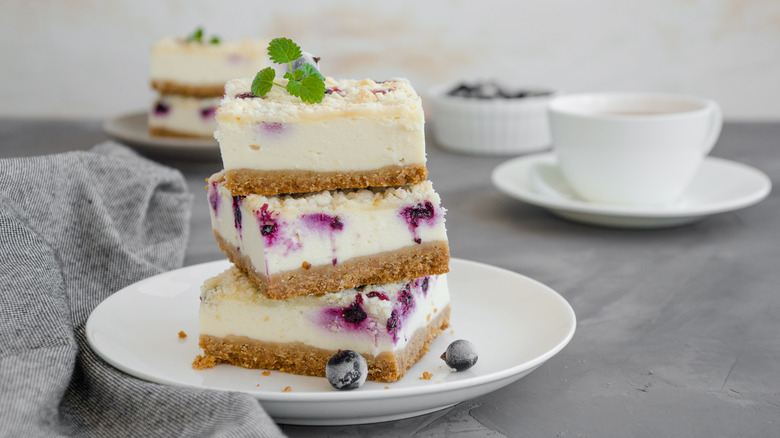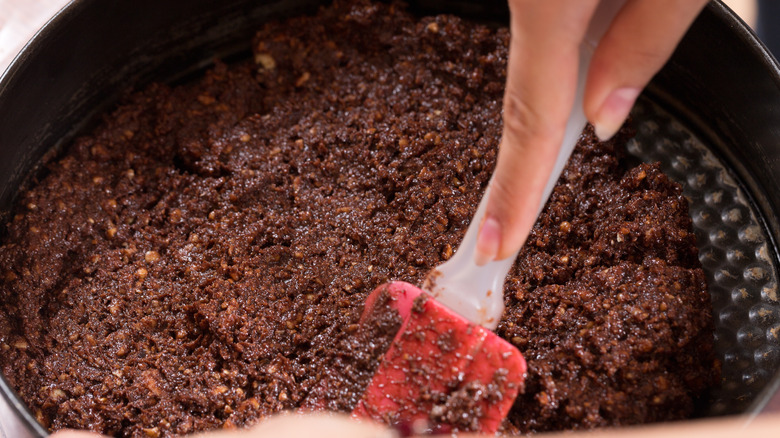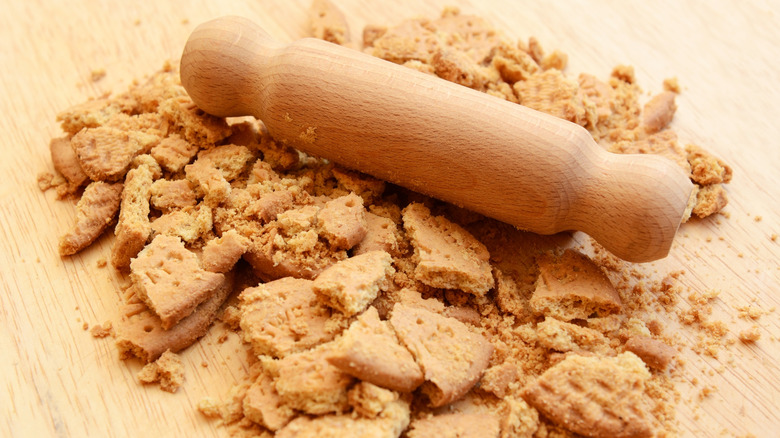Homemade Vs Pre-Made Cheesecake Crust: Everything You Need To Know
Whether you're a seasoned baker or a novice in the kitchen, crafting the perfect cheesecake begins with a crucial decision — the crust. While some opt for the convenience of pre-made crusts, others swear by the art of creating a homemade one from scratch.
The crust is the foundation of any cheesecake and plays a pivotal role in the overall taste and texture of the dessert. It serves as a sturdy yet tender platform upon which the creamy cheesecake filling can shine. Homemade crust enthusiasts argue that crafting your crust allows for customization and creativity. You can experiment with different types of cookies or crackers, adjust the sweetness to your liking, and even incorporate unique flavors like cinnamon or cocoa. This level of control over the crust's composition can elevate your cheesecake to a gourmet level, perfectly tailored to your preferences.
Conversely, fans of pre-made crusts appreciate the convenience they provide. Store-bought crusts are a time-saving option, especially for busy home bakers. They are readily available in most grocery stores, eliminating the need for measuring and crushing cookies or crackers. Additionally, pre-made crusts offer consistency, ensuring that every slice of cheesecake is uniform in taste and texture. We'll delve deeper into the nuances of both homemade and pre-made cheesecake crusts, helping to find the right option for you.
Ingredients
Homemade crusts start with graham crackers. When you make your own base, you can choose which crackers you use, so you can opt for ones that don't contain palm oil or high fructose corn syrup, for instance. Then, you have your choice of fat. Butter adds richness and flavor to the crust. However, you can also use non-dairy margarine if you're vegan or can't tolerate dairy. Granulated sugar is commonly added to sweeten the crust, balancing the natural tartness of the cheesecake filling. The amount of sugar can be adjusted to suit personal preferences. Finally, some bakers enhance the crust's flavor with additions like cinnamon, nutmeg, or vanilla extract. These ingredients can elevate the overall taste of the cheesecake.
Now, we move on to pre-made graham cracker crusts. Pre-made crusts are typically made from crushed graham crackers or a similar type of cookie. These crumbs are processed and formed to create a consistent texture. Instead of butter, pre-made crusts often contain vegetable oil or shortening as a binding agent. This choice affects the texture and flavor of the crust. Just like in homemade crusts, sugar is added to provide sweetness. However, other sweeteners are often added, such as corn syrup.
Cookie type
Homemade cheesecake crusts offer a world of possibilities when it comes to cookie selection. While graham crackers are a classic choice, creative bakers can experiment with a wide range of cookies to achieve unique flavors. Options include chocolate cookies, vanilla wafers, ginger snaps, shortbread, speculaas, and Oreos.
Because you can use different types of cookies, homemade cheesecake bases give you way more flavor options than store-bought ones. For example, using chocolate cookies creates a rich, cocoa-infused base, while ginger snaps add a delightful spiciness. This flexibility lets you tailor the crust to complement your cheesecake's filling or your personal taste preferences.
While pre-made crusts may offer some variation, such as chocolate or cinnamon-flavored crusts, the choices are generally more limited compared to homemade options. In most stores, you'll only find graham cracker cheesecake bases or pastry pie crusts. This limits your ability to customize the flavor profile of your cheesecake. When you choose a store-bought crust, you can't tailor your choice of cookie to the ingredients in the filling of your cheesecake, meaning the resulting dessert is likely to taste less special and more standard or everyday.
Taste
The flavor of the cheesecake crust is a critical element in the overall taste experience of this beloved dessert, so let's compare your options. Homemade crusts are often made with real butter, which imparts a luxurious richness to the crust. In contrast, store-bought graham cracker bases almost always use vegetable shortenings or vegetable oils, meaning you lose that buttery flavor. In fact, some people recommend adding butter to pre-made bases to improve the flavor — at which point you might as well have made your own.
Then, there's the ability to customize the taste and flavor profile of your base, which is one of the most significant advantages of homemade crusts. While store-bought crusts are convenient, they offer limited flavor options compared to homemade alternatives.
What's more, in homemade crusts, you have control over the amount of sugar added. This means you can adjust the level of sweetness to your preference, whether you prefer a slightly sweet or intensely sugary crust. In contrast, pre-made crusts often contain a moderate amount of sugar to provide a balanced level of sweetness that can complement a variety of cheesecake fillings.
Crust style
Homemade cheesecake crusts open the door to a world of creative possibilities, allowing you to experiment with various crust styles and ingredients, such as shortcrust, nut crusts, and oat-based crusts. This flexibility sets homemade crusts apart from their pre-made counterparts, which often come in limited styles and flavors.
While shortcrust is often reserved for classic pies and tarts, you can absolutely use it for cheesecake, too. When you're making your cheesecake crust yourself, you can make a sweet shortcrust, which is a good pairing for cheesecake filling. Of course, you can also buy pre-made shortcrust pie crusts that you can use for cheesecake, but you can't adjust the sweetness to suit your needs.
Nuts, such as almonds, pecans, or hazelnuts, can be finely ground and combined with other ingredients to craft nut-based crusts. These crusts introduce delightful complexity and crunch to your cheesecake. While you might occasionally be able to find a store-bought nut pie crust, you won't have the same choice of nut types.
Then, there are oat-based crusts, which provide a wholesome and hearty alternative to graham cracker and other cookie crusts. Oats lend a pleasant chewiness and earthy flavor to your dessert. Oat crusts generally aren't something you'll be able to find pre-made.
Texture
The texture of a cheesecake crust impacts the finished dessert and can mean the difference between something awesome and something not worth trying again. When comparing homemade cheesecake crusts to pre-made cheesecake crusts, there are noticeable differences in texture that can impact the final result.
Homemade crusts let you customize the texture more. Depending on the type of cookies or ingredients you choose, you can control whether the crust is crumbly, crunchy, or slightly chewy. You can adjust the ratio of cookie crumbs to butter and sugar to achieve your desired texture. However, with store-bought crusts, you have just one texture — the one you're given. You can't adjust it to make the cookie pieces chunkier or to give it a chewy finish.
But perhaps the most notable difference is the level of crumbliness. Many homemade cheesecake bases have a degree of crumbliness, but they should also keep their shape and be moist and tender. The trouble with pre-made graham cracker crusts is that they're often dry and overly crumbly. Not only is this a less pleasant texture, but it also means they don't hold their shape well. You might find the base of your cheesecake crumbling away from beneath the filling when you slice and serve it.
Thickness
Everyone has their preference for different cheesecake base thicknesses. Some people like it fairly thin so the main focus is on the filling, while others like an extra-thick base for lots of cookie crust goodness to contrast the rich creaminess of the filling. When it comes to thickness, homemade cheesecake crust has a clear advantage.
When you make your own crust, you have complete control over thickness. It's up to you how much crust you press into the bottom of the pan— you can tailor the thickness to achieve the ideal balance between the crust and the creamy filling. This precision allows you to create a harmonious dessert that suits your taste preferences. If you want an extra-thick base, you can find recipes that offer a thicker-than-average crust or you can double the recipe.
On the other hand, store-bought cheesecake crusts come with a predetermined, uniform thickness. These crusts are designed for convenience and ease of use, and as a result, the thickness is generally consistent from one crust to another. As such, there's no room for customization in terms of thickness. While this can make the assembly process quicker and more straightforward, it may not cater to individual preferences.
Size
Homemade crusts offer the invaluable advantage of complete flexibility in terms of size. You can adapt the crust to fit the dimensions of your baking pan, whether it's a standard 9-inch or 10-inch round pan, something larger, something smaller, or even individual mini cheesecake molds. This versatility allows you to create cheesecakes of various sizes and shapes to suit your needs and preferences. If you want to cater to a crowd, it's easy to size up your dessert, or if you only need something petite, that's fine, too. Cheesecake recipes will tell you what size pan to use, so you won't end up with too much or too little filling.
Pre-made cheesecake crusts generally come in standard sizes, most commonly 9-inch or 10-inch rounds. These sizes are convenient and widely used, but they offer little flexibility. So, if you want to make individual mini cheesecakes or extra-large cheesecake to feed a big group, you might not be able to find a suitable store-bought option. If you follow a cheesecake recipe that calls for a different size base, you'll either end up with an underfilled cheesecake or with loads of leftover filling.
Shape
Sick of boring old round cheesecakes? The beauty of homemade cheesecake crust is the ability to make it into any shape you want. You can use a variety of pans or molds to create cheesecakes in various shapes, from classic rounds to squares, rectangles, hearts, or even novelty shapes.
The ability to adapt the crust shape allows for artistic expression in your dessert presentation. You can craft beautiful cheesecakes in any shape you like, whether it's to fit a theme for a special occasion or just because. In contrast, you can only buy round pre-made cheesecake crusts, so it's circular or nothing.
Then, there's the issue of the sides. When making homemade cheesecake crusts, you have the flexibility to choose whether to include sides or have no sides at all. Some folks prefer a crust that only lines the bottom of the pan, creating a clean and elegant look without crust edges climbing up the sides. But pre-made cheesecake crusts are really multipurpose pie crusts and always have high sides — whether you like it or not.
Ultimately, homemade crusts are a must if you want to be able to experiment when shapes other than circles. But if you're more than happy with a round cheesecake base with high sides, then either pre-made or homemade will do.
Price
When it comes to the price of cheesecake crusts, there are notable differences between homemade and pre-made options. Generally, homemade crusts tend to be more cost-effective, but the final cost can vary depending on the quality of the ingredients you choose.
The core ingredients for a simple homemade crust typically include cookies or graham crackers, butter, and sugar. These items are usually readily available and budget-friendly. The cost of a homemade crust can be tailored based on your preferences and budget. You have the flexibility to choose generic cookies or crackers, which are usually inexpensive, and standard butter and sugar. This allows for cost control while still achieving a delicious crust.
On the flip side, if you decide to use high-end ingredients like organic cookies, cultured butter, or premium raw sugar, the cost of a homemade crust can increase. While this may lead to a more luxurious and flavorful crust, it can also make the homemade option the same price as — or even more expensive than — store-bought alternatives.
Pre-made cheesecake crusts are known for their convenience, but this convenience often comes at a slightly higher price point. You're paying for the convenience of having a ready-made crust that saves you time and effort. That said, the price of pre-made crusts is relatively consistent across brands, so you know how much it will cost, compared to homemade bases with more potential price variation.
Convenience
Here's where pre-made cheesecake bases really shine — convenience. Making a homemade cheesecake crust involves crushing cookies or crackers or blitzing them in a food processor before mixing them with melted butter and sugar, and then pressing the mixture into the pan. In some cases, you'll then need to pre-bake the crust, although some recipes leave it raw. While this process is straightforward, it does require some time and effort, making it less convenient than simply using a pre-made crust.
Pre-made cheesecake crusts, on the other hand, are a convenient time-saver. They come ready to use, eliminating the need to crush cookies, measure ingredients, or prepare a crust from scratch. You don't need to bake them, either. They're totally ready to use. This is a significant advantage for busy individuals or those looking to streamline their baking process.
The convenience of pre-made crusts means less hands-on effort and minimal clean-up, making them an excellent choice for novice bakers or those who prefer a hassle-free dessert preparation. The convenience and ease that come with store-bought graham cracker bases are what makes them a popular choice despite their flaws.
